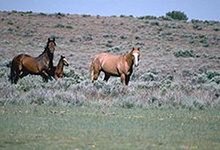A resolution to have states, not the federal Bureau of Land Management decide how many wild horses can be on a range and what to do when there’s an overpopulation, has been written by a Utah Commissioner, and has won the support of the Utah Association of Counties. The proposal will be addressed by the National Association of Counties when it meets next week in New Orleans.

Wild horses on open land
A resolution to have states, not the BLM decide how many wild horses can be on a range and what to do when there’s an overpopulation has been written by a Utah Commissioner and will be addressed by the National Association of Counties when it meets next week in New Orleans.
Meanwhile, Rep. Chris Stewart, R-Utah, is preparing legislation that would give states and Indian tribes the option to manage wild horses, much as they do other wildlife instead of leaving it up to the BLM.
Although officials in Iron and Beaver counties had threatened to round up wild horses on their own, they are now pressing for a dramatic change in how wild horses in the area are managed.
The BLM agrees there are more wild horses on the range than the agency wants, but it had planned no roundups this year because there is no room in its long-term pastures. Nearly 50,000 horses already are stockpiled there.
Under pressure from ranchers whose livestock compete for forage and water and from counties such as Iron and Beaver, however, BLM Utah Director Juan Palma got permission to remove 200 horses this summer from the two counties.
Of those, 140 are to be removed from the Blawn Wash herd area, which is largely state-owned land in Beaver County. The others are being removed bit-by-bit as they come into water traps on private property in Iron County.
Suzanne Roy, director of the American Wild Horse Preservation Campaign, called the idea that states should manage wild horses "a ridiculous proposal."
"Wild horses are protected as part of our national heritage by an act of Congress. They are a treasured resource for all Americans," she said. "This is just more posturing by the states and by the ranchers. It’s not a feasible or reasonable proposal."
Wild horse advocates believe the BLM is overstating the number of horses on the range, and that in any case, the agency should look first to reducing the number of livestock allowed to graze there. There are far more cattle than wild horses on public ranges.
